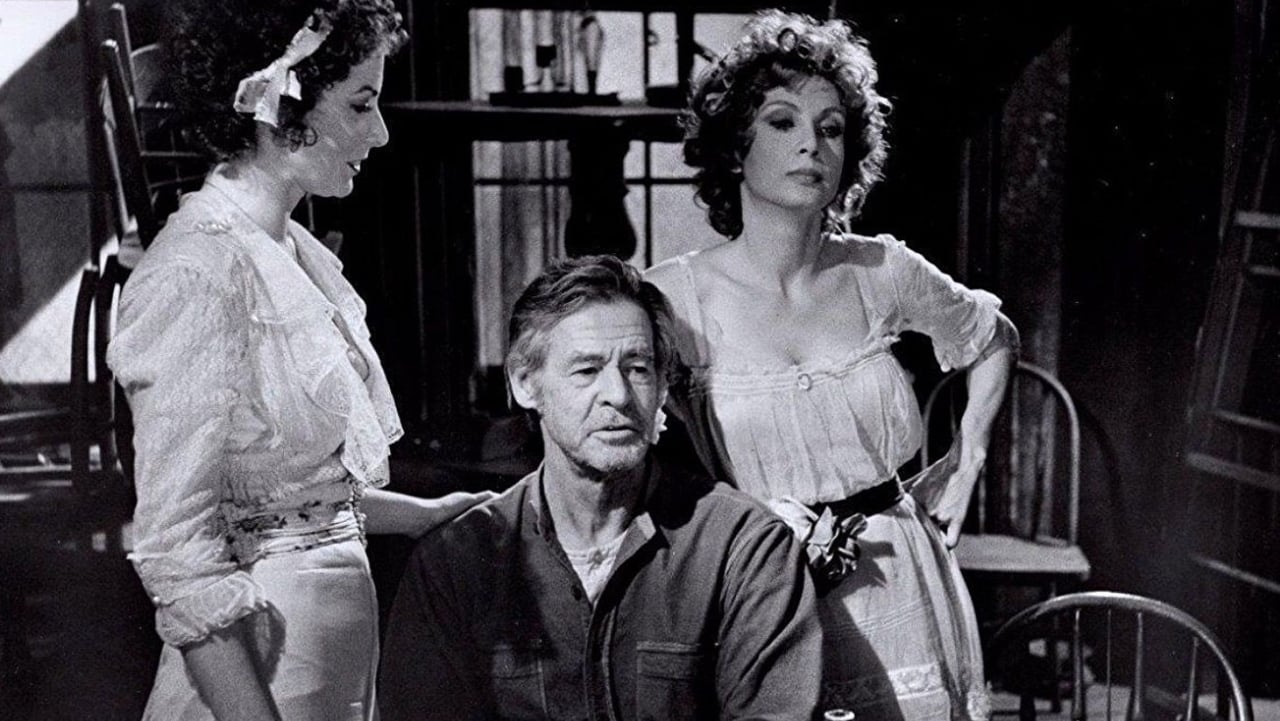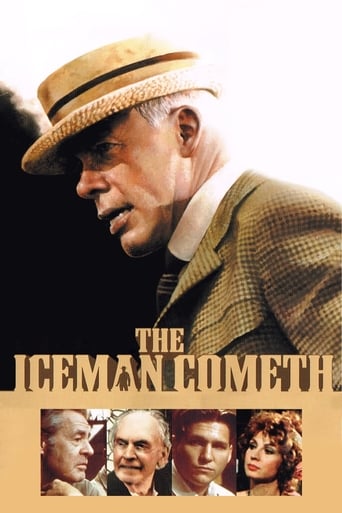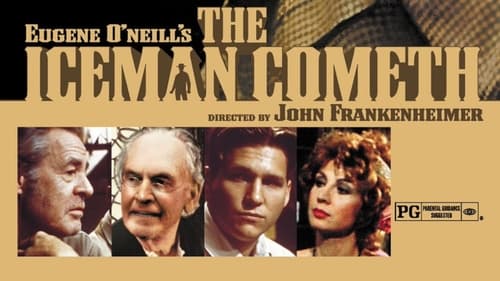sissoed
Never having see "Iceman" live or on film, I watched the 1973 Lee Marvin version first, then the 1960 Jason Robards version, because I wanted to see the Lee Marvin approach without the bias of having previously seen the famous Robards approach. Both performances were excellent: Marvin was more believable as a coarse, cheating salesman, while Robards was more soft and humane. Each connected deeply into the playwright's vision, but differently. The major difference between the two productions is not Hickey, but his main foil, Larry Slade. In the 1973 version, Ryan opens the play with hopeless bitterness, a darkness that suffuses the first scene. In the 1960 version, McCormick begins the part with a lighter, bemused detachment. In the 1960 version, Slade is reading newspapers, which shows he still has an interest in the world. In the 1973 version, Ryan's Slade is in gloom, no newspapers in sight – and no light to read them by even if he had them. In fact, the first scene of the 1973 version is so slow and gloomy that it is very hard to see any reason to watch the play. None of the characters makes you want to spend a little more time with them, and none of them interact with each other in a way that is friendly or kind. The 1960 version is much lighter, and the emotional ties between sub-groups of characters are more developed. The 1973 version comes to life only when Hickey enters (the 1960 version is alive from the start), and Marvin's Hickey redeems the tedium of the scenes that precede him. Also, in the 1973 version of the 1st scene, when one character is speaking to another, the camera is often behind and to the side of the head of the listener, showing only the back and side of the listener's head. This prevents us from seeing the listener reacting to the speaker, which turns all these speeches into soliloquies delivered into the air. Now, I don't know which version is closer to O'Neill's vision (although we can be pretty sure the 1960 version is closer to O'Neill's text), but I can say that in the 1973 version, up until Marvin's Hickey arrives, it's hard to feel any desire to listen to any of these self-involved, isolated, moody failures. In the 1960 version you get a sense that this is a community of people with some positive aspects – a web of friendships, or at least, the appearance of friendships. A problem common to both versions is the implausibility of a room full of these sleeping or lethargic people slumped over the tables, allegedly because they were all waiting for Hickey. A reviewer pointed out that the play reworks the 'Last Supper,' with Hickey in the Christ role, and the other men regulars in the role of the 12 disciples. However, there are 13 male characters in addition to Hickey, so it appears that O'Neill has changed the structure. As regards the 'Last Supper' model, the Christ character is not Hickey, but Larry Slade. He is the one whom Parritt comes to – Parritt, who betrayed the movement and his mother for money, and who thus functions in a Judas role, and who seeks Slade's forgiveness. But the Christ here – Slade – is a 'savior' who knows nothing, who has lost faith in his own movement. Hickey is the new character, one who was not at the 'Last Supper.' Hickey's repeated protestations of wanting to help the others, and the way in which he can help them, shows that Hickey is not a Christ, but a kind of Buddhist bodhisattva – to quote one definition, a being 'who delays his own final and complete enlightenment in order to save all sentient beings out of his enormous compassion … on a mission to liberate all sentient beings, and only then will he rest and complete his own enlightenment.' In 1939, when O'Neill wrote "Iceman," he was deeply interested in Eastern religions, and in fact wrote "Iceman" while living in a home he gave an Eastern name, "Tao House," meaning 'the right way of life.' At the table where the characters are all gathered for Harry Hope's birthday party, Hickey talks about how his goal is to get all of the inmates of Hope's bar feeling "you won't give a damn what you are anymore" and "don't give a damn about anything anymore" – this is the indifference, the non-feelingness, of the eastern concept of nirvana. Immediately after this, Slade responds by characterizing the people in the saloon as "us poor pipe-dreaming sinners along the sawdust trail of salvation" – the imagery of Christian salvation. This sets up the fundamental issue of the play: whether Buddhist concepts of nirvana can replace the failed (at least, failed to O'Neill) salvation concepts of Christianity. By the end of the play, we know O'Neill's answer: no. Hickey learns first that although he has forced the others to face up to the failed people they really are, this has not brought them peace; and then, almost as an accident, Hickey himself learns that his own peace has been based on a flattering lie to himself about himself. Once he sees his own reality, the reality of how fallen he really is, not even he, the bodhisattva, can face it. Seeing how the others are clinging to happiness by feeling hope that they are better than they really are, he decides to fall-in with their self-lying, so that they will also lie and tell him that they agree that he is a better person than he really is. Only Slade, the Christ-figure, says that Hickey has converted him to be able to face his worthlessness and self-deception. At this point, Parritt – following the Judas model, Judas who hung himself out of guilt – kills himself by leaping from a height.
nachtzoen
Lee Marvin does his best here, but is just not in the same class as Jason Robards who is perfect for the role. There are other fine characters in the Marvin version which makes it definitely worth a look, however, nobody in the supporting cast does a bad job. Fredric March and Robert Ryan are truly spectacular in their roles and really steal the show from Lee Marvin. The Iceman Cometh is a great play, probably the best Eugene O'Neill ever wrote. If you haven't seen it, watch this, it's a cut above the average American film. But if you're planning on buying a copy, search for Jason Robard as Hickey. Lee Marvin's acting is too one dimensional to make this an excellent film.


